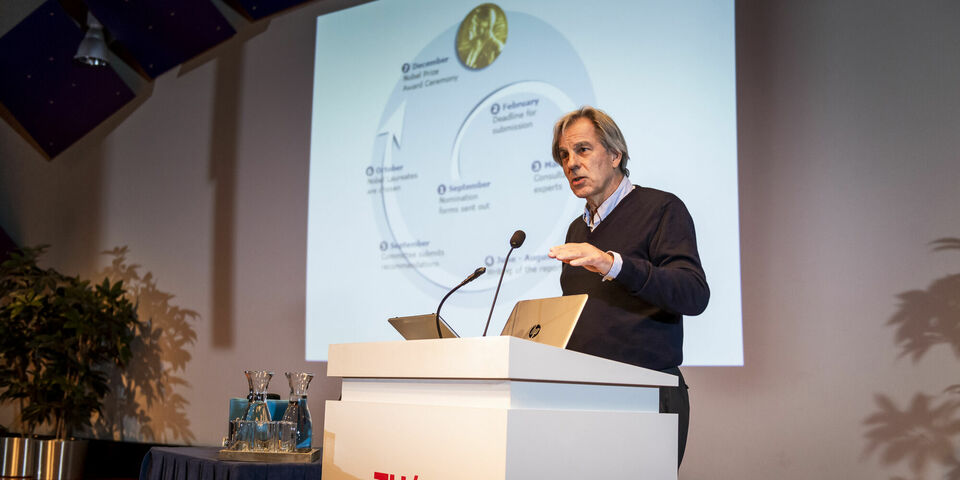Winning a Nobel Prize won't always boost your career
What does winning a Nobel Prize mean for a scientist and what are the societal effects of their laureate discoveries and inventions? And what do prize winners spend their money on? On Tuesday evening Studium Generale and the Institute for Complex Molecular Systems (ICMS) held a Nobel Prize Evening to inform students and staff members about this year's winners and to shed some light on the above-mentioned matters.
One might think that winning a Nobel Prize would do a scientist more good than harm, but this is not always the case, according to Joep Huiskamp, advisor and program manager for the Executive Board. On Tuesday evening Huiskamp shared with the audience study results that suggest winning a Nobel Prize is linked to fewer citations in the following years, very little meaningful impact on one's career, and turmoil in one's personal life. On a light-hearted note, he advised: “Try not to win a Nobel Prize if you want to boost your career as a scientist”.
The event got underway in an engaging manner: the attendees were asked to participate in a quiz about their general knowledge of the award. The questions varied from serious to funny. The audience was asked to guess what the winners spend their prize money on. The given choices were: buying a new house, on the ex-wife, buying a new boat, and funding their research. The most voted-for answer was, unsurprisingly, the ex-wife. As it turned out, this is indeed the case, although the other choices do see some of the money.
Following the quiz, Professor Bert Meijer took the stage, giving a detailed introduction on Alfred Nobel and sharing some of his own experiences of the award ceremony in 2016 when Professor Ben Feringa, his colleague during his PhD days, was awarded the prize in Chemistry. Meijer showed some videos highlighting the luxurious surroundings in which the event was held.
Oxygen
Next, Professor Jan de Boer of the Department of Biomedical Engineering gave his view of this year's Nobel Prize nominees in the field of Physiology or Medicine: Gregg Semenza, Peter Ratcliffe and William Kaelin. They have conducted research on how cells adapt to changes in oxygen levels. De Boer explained the importance of oxygen as a compound in chemical reactions and as a vital component for basic functions of the human body. As such, low oxygen levels can be detrimental to humans and other species. In these circumstances, cells can sense and adjust to lower levels of oxygen, resulting thus in both chemical and biological differences, for example gene mutations. This discovery is promising: research is now linking the adaptability of cells to different oxygen levels to finding cures for cancer. In China, a treatment based on oxygen leveling has been approved to help cure anemia, De Boer said.
Emeritus Professor Peter Notten talked about the technology developed by John Goodenough, Stanley Whittingham and Akira Yoshino that won them the Nobel Prize in Chemistry: lithium-ion batteries (LIB). Although not a recent invention, as LIB date back to 1985, their importance has been recognized only in the past few years. The traditional rechargeable battery seems to be a thing of the past: the new LIB are more efficient, environmentally friendly and have a higher energy density, making them suitable for electronics with high energy consumption, like mobile phones. Notten thinks there is still plenty of scope for improving LIB, and that the research being undertaken to achieve this is promising.
Unanswered questions
Professor Paul Koenraad was fascinated by this year's Nobel Prize in Physics, which was awarded to James Peebles, Michel Mayor and Didier Queloz, who developed radio astronomy technology. According to Koenraad, discoveries like this are crucial to our understanding of some of humanity's unanswered questions: "What is our place in the universe?”, “Is there another life beyond ours?" Some scientists in the field believe that by 2040 signs of new life will have been found. Koenraad said that he feels tentative about this promise.
At the end of the meeting Professor Peter Notten was asked the question if it wouldn't be a good idea to create a new Nobel Prize in the field of sustainability. Notten doesn't believe so. In his opinion the categories as they are today are good enough, and chancing that would make them diffuse and subject to hypes.


Discussion